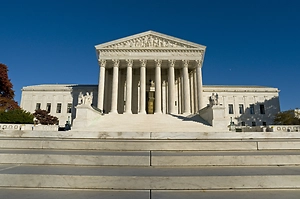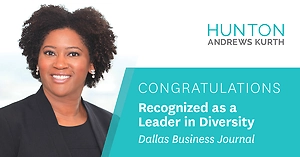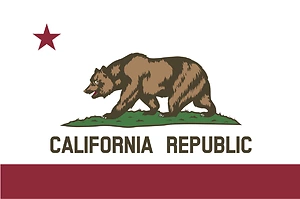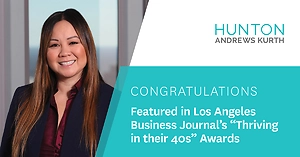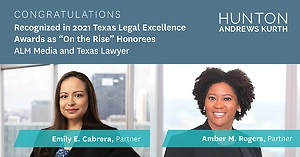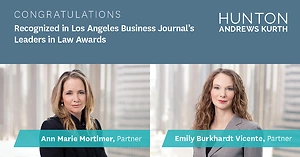The Supreme Court has granted a temporary stay of the OSHA Emergency Temporary Standard (ETS), otherwise known as the OSHA vaccine mandate. The Court ruled that OSHA had exceeded the authority delegated to it by Congress under the Occupational Safety and Health Act. In making this finding, the Court held that OSHA only has the authority to issue workplace safety standards, not broad health measures. The concurring opinion focused upon the “major questions doctrine,” which requires Congress to speak clearly when delegating authority of “vast economic and political significance” to an administrative agency.
HuntonAK labor and employment partner Amber Rogers was recently named to the Dallas Business Journal’s 2022 Leaders in Diversity awards.
On December 27, 2021, the Center for Disease Control and Prevention (CDC) updated their isolation and quarantine recommendations for the general public, including more limited time periods for quarantine and isolation periods. On December 30, 2021, the California Department of Public Health (CDPH) released updated guidance to conform to the new CDC guidelines but added additional requirements, including testing to exit isolation or quarantine after the fifth day (which the CDC now acknowledges is the “best approach” but does not require as part of its formal guidance). Notably, the new guidance also introduces a distinction between boosted and non-boosted individuals for the first time. The key requirements and takeaways from this new guidance are detailed below.
The Massachusetts Personnel Records Law, M.G.L. chapter 149, § 52C gives employees the right to submit written rebuttals to any negative information contained in a personnel file if the employee truly disagrees with the content of the information. The written rebuttal then becomes a permanent feature of the employee’s personnel file.
On December 16, 2021, the California Occupational Safety and Health Standards Board (“Cal/OSHA”) adopted revisions to the current COVID-19 Prevention Emergency Temporary Standards (“ETS”). The Cal/OSHA ETS were first approved on November 30, 2020, adopted again with modifications on June 17, 2021, and recently readopted with additional revisions. The newest version of the ETS will go into effect on January 14, 2022, and will apply to all non-remote workers in California except those covered by the Aerosol Transmissible Diseases standard, such as healthcare workers.
HuntonAK Labor and Employment partner Julia Trankiem has been selected as part of the Los Angeles Business Journal’s “Thriving in Their 40s” 2021 award.
The award recognizes outstanding leaders and professionals in Los Angeles in their 40s. Julia was selected based on her contributions to the firm and profession. Julia’s profile can be seen online at LABJ.
Julia was also named among the “Minority Leaders of Influence: Attorneys” awards by the Los Angeles Business Journal in 2019 and 2021, and listed as a California Labor and Employment Star by Benchmark Litigation in ...
On December 13, 2021, the Massachusetts Supreme Judicial Court (“SJC”) issued its long-awaited decision determining that the Massachusetts Independent Contractor Statute, G.L. c. 149, § 148B (“Independent Contractor Statute”), which establishes the three-pronged “ABC” test used to classify workers as independent contractors or employees – and provides for a rebuttable presumption that workers are employees unless the purported employer proves otherwise – is not the applicable standard to determine whether an entity is a joint employer.
HuntonAK labor and employment partner Amber Rogers was recently listed as an “On the Rise” honoree by ALM Media and Texas Lawyer’s 2021 Texas Legal Excellence Awards.
HuntonAK Labor and Employment partner and practice group co-chair Emily Burkhardt Vicente was selected as a Finalist in the Los Angeles Business Journal’s “Leaders in Law” awards for Labor and Employment 2021.
The United States Supreme Court has agreed to take a closer look at the enforceability of arbitration agreements that bar representative claims brought under PAGA, a California law that allows individual employees to police labor code violations.
Search
Recent Posts
Categories
Tags
- #MeToo
- 100 Days
- 1094-C
- 1095-C
- 14th Amendment
- 2017 Tax Act
- 2018 Budget
- 2024 Election
- 29 C.F.R. § 785.48
- 3rd Circuit
- 40 & Under Hot List
- 408(b)(2)
- 4th Circuit Court of Appeals
- 5th Circuit
- 80/20
- 9th Circuit
- 9th Circuit Court of Appeals
- A Day Without A Woman
- AAP
- AB 1506
- AB 1522
- AB 1897
- AB 2257
- AB 2751
- AB 2770
- AB 304
- AB 465
- AB 5
- AB 51
- AB 685
- AB 84
- AB5
- AB51
- Abbott
- ABC Test
- Abruzzo
- Absolute Healthcare
- ACA
- Accessibility
- Accommodation
- Accommodations
- ADA
- ADAAA
- Adam Rosser
- ADEA
- Administrative Agencies
- Administrative Exhaustion
- Administrative Law Judge
- Adverse Action
- Advice
- Advice Exception
- Affirmative Action
- Affordable Care Act
- AFL-CIO
- Age Discrimination
- Agency
- Agency Developments
- Agency Fees
- Agency Guidance
- Agency Relationship
- Agency Updates
- Agreement
- AI
- Air Quality Index
- Airline Worker
- Alan Marcuis
- Alcohol Policy
- Alcoholism
- ALJ
- ALJ Bench Book
- Alternative to Termination
- Alvarado v. Cajun Operating Company
- Alyson Brown
- Amber Rogers
- Ambush Election
- Ambush Elections
- American Health Care Act
- American Lawyer
- American Steel
- American Taxpayer Relief Act of 2012
- Americans for Financial Reform
- Americans with Disabilities Act
- Amicus Brief
- Andy Stern
- Anna Burger
- Anna L. Rothschild
- Anti-Discrimination
- Anti-Harassment
- Anti-Harassment Training
- Anti-Poaching Agreements
- Antitrust
- APA
- Appeal
- Apprentice
- Apprenticeship Programs
- AQI
- Arbitral Deferal Standards
- Arbitration
- Arbitration Agreements
- Arbitration; Class Actions; Sexual Harassment; Employment; Retaliation
- ARRA
- Article III
- Article III Standing
- Artificial Intelligence
- Assembly Bill 51
- Assurances
- AT&T Mobility v. Concepcion
- Attorney-Client Privilege
- Audit CAP
- Automated Decisionmaking
- Awards
- Back to Work Emergency Ordinance
- Background Check
- Background Checks
- Backpay
- Ballots
- Ban The Box
- Bank Executives
- Banking
- Bankruptcy
- Banner Health Systems
- Bannering
- Bargaining Process
- Bargaining Unit
- Bargaining Units
- Bay Area Commuter Benefits Program
- Baylor
- Bellus Academy
- Benchmark Litigation
- Benefit Plans
- bereavement
- Biden Administration
- Biden Board
- Biden NLRB
- Biden Presidency
- Biden-rule
- Bill Halter
- Biometric Data
- Biometric Information
- Biometric Screening
- Biometrics
- BIPA
- Bitcoin
- Blacklisting
- Blanche Lincoln
- Blanket L-1
- Bloomberg Law
- Bob Quackenboss
- Boeing
- Bone Marrow Donor
- Bonus Plan
- Bostock
- Boston Business Journal
- Bowman
- Braille
- Breach of Fiduciary Duty
- Break Time
- Breaks
- Brett Burns
- Brian Hayes
- Bright v. 99 Cents Only Store
- Brinker
- Broken Laws, Unprotected Workers
- Brooke Hollmann
- Browning-Ferris
- Budde v. Kane County Preserve
- Budtender
- Burns Successor
- Burton Awards
- Business Closure
- Business Continuity
- Business Interruption Coverage
- Business Necessity
- Business of Law Visionary
- Business Suspension
- Buy-Sell Agreements
- CA
- CACI
- CADA
- Cadillac Tax
- Caesars
- CAFA
- Cafeteria Plan
- Cal-OSHA
- Cal/OSHA
- California
- California Civil Rights Department
- California Department of Public Health
- California Developments
- California Employers
- California Employment Law
- California Employment Laws
- California Face Covering Guidance
- California Fair Employment and Housing Act
- California Fair Pay Act
- California Kin Care Laws
- California Labor Code
- California Labor Code section 432.3
- California Law
- California Leave
- California Legislation
- California Non-Compete Agreements
- California Occupational Safety and Health Standards Board
- California Supreme Court
- California Supreme Courts
- California Transparency in Supply Chain Act
- California Wages
- California Wildfires
- California Worker Adjustment and Retraining Notification Act
- Call to Action on Jobs
- CalOSHA
- Cannabis
- Cannabis Laws
- Cannabis Oil
- Captive Audience
- Card Check
- Card Checks
- CARES Act
- Case Processing
- Cats Paw
- CBA
- CBD Laws
- CCP Section 998
- CCPA
- CCRAA
- CDC
- Cell Phone Ban
- Cemex
- Centers for Disease Control and Prevention
- cert
- Certification
- Certification Analysis
- certiorari
- CFPB
- CFRA
- Chai Feldblum
- Chairman McFerran
- Chamber of Commerce
- Chambers USA
- Change to Win
- Charge Statistics
- Checking Employee Temperature
- Chevron
- Child Care Benefits
- CHOICE Act
- Chris Pardo
- Christopher M. Pardo
- Christopher Pardo
- Christopher v. SmithKline Beecham
- Circuit Split
- City Ordinances
- City Ordinances; Non-compete; Restrictive Covenants; District of Columbia
- Civil Procedure
- Civil Rights
- Civil Rights Act
- Claims-Processing
- Class Action
- Class Action Waiver
- Class Action Waviers
- Class Actions
- Class Arbitration
- Class Certification
- Class of Workers
- Class Representatives
- CLE
- Clean Air Act
- Client Employer
- Close Contact
- Closure
- Cloth Face Covering
- COBRA
- Code of Conduct
- Coercion
- Collective Action
- Collective Actions
- Collective Bargaining
- Collective Bargaining Agreement
- Colorado
- Colorado’s Antidiscrimination Act
- Commonality Requirement
- Community Health Systems
- Commute Time
- Commuter Benefits
- Companionship Services
- Company Policies
- Compensation
- compensation analysis
- Compensation Data
- Compensation Data Collection
- Compensation Discrimination
- Compensation Excise Tax
- Compensation Policies
- complex litigation
- Compliance
- Component 2
- Concerted Activity
- Conciliation
- Concrete Injury
- Conditional Certification
- Condominiums
- Confidential Information
- Confidentiality
- Confidentiality Agreements
- Confidentiality Policies
- Confidentiality Policy
- Congress
- Consent
- Consequential Damages
- Constitutional Law
- Construction
- Consumer Financial Protection
- Consumer Report
- Consumer Reporting Agency
- Consumer Reports
- Consumer Rights
- Contingency Plan
- Contraception Mandate
- Contract Bar Doctrine
- Contract Workers
- Contractor Oversight
- Convertino
- corona virus
- Coronavirus
- Coronavirus/COVID-19
- Corporate Counsel
- Corporate Governance
- Costco
- Court of Appeals
- coverage penalty
- Covered Businesses
- Covered Service Provider
- COVID
- COVID 19 Tests and Vaccines
- Covid-10
- COVID-19
- COVID-19 Guidance
- Craig Becker
- Craig Leen
- Credit Checks
- Credit Report
- Criminal Background Check
- Criminal Background Checks
- Criminal Conviction
- Criminal History
- Criminal History Discrimination
- Critical Infrastructure
- Cryptocurrency
- CSAL
- Curaleaf
- Current Events
- D.R. Horton
- DADT
- Daily Journal
- Dallas Business Journal
- Dallas Paid Sick Leave
- Damages
- Dana. Corp
- Daniel J. Grucza
- Data
- Data Collection
- Data Security
- Daubert
- David Lopez
- David Michaels
- Day of Rest
- Day Rate
- DC Circuit
- De Minimus Doctrine
- DE&I
- Debt Ceiling
- Decertification
- Defamation
- Deferral
- Definitions
- DEI
- Deliberative Process
- Delivery Drivers
- Department of Fair Employment and Housing
- Department of Homeland Security
- Department of Justice
- Department of Labor
- DFEH
- DHS
- Direct Care Workers
- Direct Deposit
- Directive 2018-01
- Directive 2018-02
- Directive 2018-03
- Directive 2018-04
- Directive 2018-05
- Directive 2018-06
- Directive 2018-07
- Directive 2018-08
- Directive 2018-09
- Disability
- Disability Accommodations
- Disability Disclosure
- Disability Discrimination
- Disability Leave
- Disclosure
- Disclosure Requirements
- Discovery
- Discrimination
- Dismissal and Notice of Rights
- Disparate Impact
- Dispute Resolution
- Distracted Driving
- Distribution Policy
- District of Columbia
- Diversity
- Diversity & Inclusion
- Diversity and Inclusion
- Diversity, Equity and Inclusion
- DLSE
- DOD
- DOD Act
- Dodd-Frank
- DOJ
- DOL
- DOL Guidance
- DOL Regulations
- DOMA
- Domestic Violence
- Domestic Workers
- Domino’s
- Donald Trump
- Donning and Doffing
- Doug Parker
- Dreadlocks
- Drei Munar
- Dress Code
- Dress Policies
- Drug Testing
- Drugs
- DSM
- DTSA
- Dues Checkoff
- dues deduction
- dues-checkoff
- Dukes v. Wal-Mart
- DuPont
- Duty of Fair Representation
- Duty to Bargain
- Duty to Defend
- E-3
- E-Verify
- EARN
- Earned Sick Time Act
- Ebola
- EBSA
- Economic Damages
- Economic Exigency
- Economic Loss Rule
- Economic Realities
- EEO
- EEO-1
- EEO-1 Reporting
- EEOC
- EEOC Developments
- EEOC Explore
- EEOC Proposed Rules
- EEOC v. Burlington
- EEOC v. Simbaki
- EEOC v. United Parcel Service
- EEOC; EEO-1; Pay Data
- Effects Bargaining
- Election
- Election Rule
- Election Rules
- Elections
- Electronic Communications
- Electronic Communications Policy
- Electronic Data
- Electronic Disclosure Regulations
- Electronic Representation Elections
- Electronic Signature
- Electronic Timesheet
- Electronic Voting
- Eleventh Circuit
- Eliason
- Elizabeth Dougherty
- Email Policies
- Emergency Ambulance Employee Safety and Preparedness Act
- Emergency Exception
- Emergency Family and Medical Leave Expansion Act
- Emergency Family Medical Leave Expansion Act
- Emergency Paid Sick Leave
- Emergency Temporary Standard
- Emergency Temporary Standards
- Emily Burkhardt Vicente
- EMPA
- Employee
- Employee Agreements
- Employee Benefits
- Employee Benefits Academy
- Employee Classification
- Employee Classification; Wage and Hour; Labor Unions
- employee compensation
- Employee Confidentiality
- Employee Contact Information
- Employee Credit Privacy Act
- Employee Data
- Employee Discipline
- Employee Expenses
- Employee Handbook
- Employee Handbooks
- Employee Information
- Employee Leave
- Employee Misclassification Prevention Act
- Employee Misconduct
- Employee Notice
- Employee Privacy
- Employee Raiding
- Employee Representative
- Employee Rights
- Employee Rights Poster
- Employee Termination
- Employee Theft
- Employer
- Employer Liability
- Employer Mandate
- Employer Penalty
- employer shared responsibility
- Employment
- Employment Agreements
- Employment Contract
- Employment Contracts
- Employment Discrimination
- Employment Eligibility
- Employment law
- Employment Litigation
- Employment Policies
- Employment Policies; Labor Unions; Unions; NLRB
- Employment Practices Liability
- Employment Records
- Employment Suspension
- Employment Terms
- Encino Motorcars
- ENDA
- Enforcement
- English Only Policy
- Enhanced Government Enforcement
- EPCRS
- Epic Systems
- Epidemic
- EPLI
- EPOA
- Equal Employment Opportunity Commission
- Equal Pay
- Equal Pay Act
- Equal Pay Report
- Equal Protection
- Equal/Fair Pay
- Equitable Tolling
- Ergonomics
- ERISA
- ESA
- ESG
- Essential Business
- Essential Critical Infrastructure Worker
- Essential Employees
- Ethics
- ETS
- EU
- Europe
- Event Cancellation
- Event Cancellation Insurance
- Events
- Evidentiary Requirements
- Excelsior List
- Excess Compensation Tax
- Excess Severance Tax
- Exclusion
- Exclusions
- Executive Compensation
- Executive Order
- Executive Order 11246
- Executive Order 13665
- Executive Order 13672
- Executive Order 13673
- Executive Order 13706
- Executive Orders
- Exempt
- Exempt/Non-Exempt Status
- Exemption
- exemptions
- Exhaustion
- Expense Reimbursement
- Expense Reimbursements
- Expressive Conduct
- extension
- F-1
- FAA
- FAAAA
- Face Covering
- Face Mask
- Failed Adoption
- Failed Surrogacy
- Failure to State a Claim
- Fair Chance Act
- Fair Credit Reporting Act
- Fair Employment Opportunity Act of 2011
- Fair Labor Standards Act
- Fair Pay
- Fair Pay Act
- Fair Pay and Safe Workplaces
- Fair Playing Field Act
- Fair Representation
- Fair Share
- Fair Wages for Workers with Disabilities Act
- Fairness for All Marylanders Act
- False Claims Act
- Families First Act
- Families First Coronavirus Response Act
- Family and Medical Leave Act
- Family Care
- Family Friendly Workplace Ordinance
- Family Leave
- Family Responsibilities
- FAR Council
- Farmers Pride
- FASA
- FCPA
- FCRA
- Federal Acquisition Regulations
- Federal Agencies
- Federal Agency Rulemaking
- Federal Arbitration Act
- Federal Arbitration Association
- Federal Budget
- Federal Contract Compliance
- Federal Contractors
- federal court
- Federal Government Shutdown
- Federal Reserve
- Federal Rules of Appellate Procedure
- Federal Rules of Civil Procedure
- Federal Subcontractors
- Fee Disclosures
- FEHA
- FFCRA
- FICA
- Fiduciary
- Fiduciary Fees
- Fifth Circuit
- Fifth Circuit. Wage and hour
- Fight for 15
- Final Pay
- Final Rule
- Final Rulemaking
- Financial Institutions
- Financial Privacy
- Financial Reform
- Financial Services
- Financial Speculation Tax
- Fingerprinting
- Firearm Policies
- Firefighters
- First Amendment
- Flatbush Gardens
- Flexible Flyer
- Flexible Spending Account
- Float
- Florida
- FLSA
- FLSA Settlement Agreements
- FLSA/Wage & Hour
- FLSA; Collective Action; Class Action; Supreme Court; Sixth Circuit; Arbitration; NLRB
- Flu Vaccine
- FMLA
- FMLA/Leaves of Absence
- FOIA
- Food Safety
- Food Services
- Footwear
- Form 1094-B
- Form 1094-C
- Form 1095-B
- Form 1095-C
- Form I-9
- Form W-2
- Fourth Circuit
- FPIIS
- FPUC
- Franchise
- Franchise Rule
- Franchisee
- Franchisor
- Franchisor Liability
- Franchisor/Franchisee
- Fraud Detection and National Security Directorate
- FRD
- Free Speech
- Freelance Worker Protection Act
- Front Pay
- FRSA
- FSA
- FSIS
- FSMA
- FTC
- Furlough
- FUTA
- Garnishment
- Gary Enis
- Gavin Newsom
- Gender Discrimination
- Gender dysphoria
- Gender Identity
- Gender Stereotype
- Gender Sterotype
- General Counsel
- General Counsel Memo
- General Jurisdiction
- General Liability Insurance Policy
- Genetic Information
- Georgia
- Gig-Economy
- GINA
- GINA Proposed Rules
- Good Faith
- good faith offer
- Government Contractors
- Government Contracts
- Government Enforcement
- Government Litigation
- Government Shutdown
- Graphic Designer
- Gratuities
- Gratuity
- Greg Robertson
- Gregory B. Robertson
- Grievance Settlement Agreements
- Grooming Policies
- Gross Negligence
- Gross v. FBL Financial Services
- Group Health Plans
- Guidance
- Guide for Employers
- Guide for Wounded Veterans
- Guns
- Gwynne Wilcox
- H-1B
- H-1B Visa
- H-1B1
- H.R. 3200
- H.R. 4173
- H.R. 674
- Hair Discrimination
- Hampton Roads
- Hanover Insurance
- Harassment
- Harassment Policies
- Harassment Prevention
- Harassment Training
- Hardship Distribution
- Harvard
- HazCom
- HB 2127
- Health Care
- Health Care Reform
- Health Coverage Reporting
- Health Insurance Carriers
- Health Insurance Exchange
- Health Plan Identifier
- Health Plans
- Health Reimbursement Arrangements
- Health Risk Assessment
- Health Workplaces
- Healthcare
- Healthy
- Healthy Families Act of 2014
- Heat
- Heat Rule
- Helix
- Hewitt
- HHS
- Hilda Solis
- HIPAA
- HIPAA Wellness Rules
- hiring
- Hiring and Monitoring Employees
- Hiring Policies
- Hiring Practices
- Hiring Test
- Holly Wiliamson
- Holly Williamson
- Home Care Workers
- Hostile Work Environment
- Hotel Industry
- Hotel Workers
- Hotels
- Hourly Wage
- Hourly Workers
- Hours Worked
- HPID
- HR 620
- HRA
- HRAs
- Human Capital Rule
- Human Trafficking
- Hunton Andrews Kurth
- Hy-Brand
- I-9
- I2P2
- Ian Band
- ICE
- ICRAA
- IGT
- Illinois
- Illinois Drug Law
- Illinois Human Rights Act
- Illinois Secure Choice Savings Program Act
- Immigration
- Immigration & Customs Enforcement
- Immigration and Nationality Law Blog
- Immigration Ban
- Immigration News
- Immunity Notice
- Implied Consent
- In Loco Parentis
- In-home Care
- In-Plan Roth Rollover
- Inclusive Communities Project
- Independent Contractor
- Independent Contractors
- Indoor Airspace
- Industry Shutdown
- Inevitable Disclosure
- Infectious Period
- Inflatable Rat
- Influence & Power in Law Awards
- Injury-in-Fact
- Institute for Workplace Equality
- Insurance Agents
- Insurance Coverage
- Insurance Recovery
- Interactive Process
- Interlocutory
- Intermittent Leave
- International Game
- Interns
- Interpretation Letters
- Interrogation
- Invasion of Privacy
- Invention
- investigation
- Investigations
- Investigatory Interview
- Iqbal
- IRS
- IRS Notice 2019-18
- Iskanian
- Isolation
- Itemized Listing
- J-1
- Jacqueline Berrien
- Jan Brewer
- Jarkesy
- Jennifer Abruzzo
- Job Applicant
- Job Killers of 2019
- Job Posting
- Job postings
- Johnny Isakson
- Johnson & Johnson
- Joinder
- Joint Employer
- Joint Employment
- Jordan Barab
- Joy Silk
- Juan Enjamio
- Judge Hudson
- Judicial Estoppel
- Judicial Records
- Julia Trankiem
- Julia Trankiem; Los Angeles Business Journal; Awards
- Jurisdiction
- Jurisdictional Prerequisite
- Justin F. Paget
- Katherine Sandberg
- Katie Cole
- Kentucky River
- Kevin M. Eckhardt
- Kevin White
- Kin Care Law
- Knowles
- Kurt Larkin
- Kurt Powell
- L-1
- LA Times
- LABJ
- Labor
- Labor and Employment
- Labor and Pensions
- Labor and Workforce Development Agency
- Labor Certification
- Labor Code
- Labor Code Private Attorneys General Act of 2004
- Labor Code Section 558
- Labor Code §2801
- Labor Contractor Employee Report
- Labor Contracts
- Labor Dispute
- Labor law
- Labor Management Relations Act
- Labor Regulations
- Labor Relations
- Labor Rights
- Labor Unions
- Labor-Management Relations
- Lactation Policies
- Lafe Solomon
- Lanham Act
- Lawdragon
- Layoff
- Layoff Avoidance
- Leadership Atlanta
- Leave
- Leave Law
- Leaves of Absence
- Legal 500
- Legal Standing
- Legislation
- Legislative (federal & State) Developments
- Legislative (Federal and State) Developments
- Legislative Developments
- legislative updates
- Lewis v. City of Chicago
- LGBT
- LGBT Rights
- LGBTQ
- LGBTQ Rights
- LGBTQ+
- Liability
- Lieselot Whitbeck
- LiftFund
- Light Duty
- Lilly Ledbetter Act
- Lincoln Lutheran
- Linda Puchala
- Lloyds
- LMRA
- LMRDA
- Local Ordinances
- Loper-Bright
- Los Angeles
- Los Angeles Business Journal
- Los Angeles County
- Los Angeles County Board of Supervisors
- Los Angeles Fair Chance Initiative for Hiring
- Los Angeles Times
- Loss of Business Income
- Lung Disease
- Lutheran Heritage
- Lyft
- M-1
- M. Brett Burns
- Mach Mining
- machine learning
- Machine-Learning
- Mail Ballot
- Majority
- manageability
- Manager Rule
- mandate
- mandates
- Mandatory Closure
- Mandatory Vaccination
- Manual Worker
- Mariana Aguliar
- Marijuana
- Marijuana Laws
- Marijuana Possession
- Mark Pearce
- Marvin E. Kaplan
- Mary Kay Henry
- mask
- Mass Layoff
- Massachusetts
- Massachusetts Super Lawyer
- Massachusetts Wage Act
- Masterpiece Cakeshop
- McDonnell Douglas v. Green
- McLaren Macomb
- McReynolds v. Merrill Lynch
- Meal and Rest Breaks
- meal breaks
- Meal Period
- Meal Period Waivers
- Meal Periods
- Meat Processing
- Med Trends
- Media Policies
- Media Policy
- Mediation
- Medical Clinics
- medical examinations
- Medical Marijuana
- Medical Records
- Medicare Tax
- Member Kaplan
- Member Ring
- Memo
- Memorandum
- Memorandum GC 19-01
- Mere Negligence
- Mexican Ministry of Foreign Affairs
- Michael Levine
- Michele Beilke
- Micro Units
- Micro-Unions
- Middle Class Task Force
- Middle Class Tax Relief and Job Creation Act
- Military Leave
- Millea v. Metro-North Railroad
- Miller & Anderson
- Minimum Wage
- Miscarriage
- Misclassification
- Missouri
- Mitigation
- Mixed Motive
- Mobile Application
- Mobility
- Model Employer
- Mootness
- Motion to Dismiss
- MSPA
- Mulhall v. UNITE HERE
- Musculoskeletal Disorders
- NADAA
- Natalie Tynan
- National Emphasis Program
- National Labor Relations Act
- National Labor Relations Board
- National Law Journal
- National Law Review
- National Mediation Board
- National Origin
- National Origin Discrimination
- National Retail Federation
- NCAA
- NDA
- NDAA
- Nebraska
- Negligence
- Neil Gorsuch
- Neutrality
- Nevada
- New Jersey
- new law
- New Legislation
- New Process Steel
- New Star
- New York
- New York City
- New York City Human Rights Law
- New York Employment Laws
- New York Essential Business
- New York Human Rights Law
- New York Labor Law
- New York Law
- New York Local Law 50
- New York Paid Vaccination Leave
- News & Events
- Ninth Circuit
- NLRA
- NLRB
- NLRB Poster
- NLRB; Property Rights; Misclassification
- NLRB; Union; Collective Bargaining Agreement
- No-Poach Agreements
- No-Rehire
- Noah’s Ark
- Noel Canning
- non-binary
- Non-Compete
- Non-Compete Agreements
- Non-Competes
- Non-disclosure
- Non-Disclosure Agreements
- Non-discrimination
- Non-disparagement
- Non-Exempt
- Non-Exempt Employees
- Non-Unit Employees
- Nonbinary Gender
- noncompete agreements
- Nondisclosure
- Notice 2010-84
- Notice 2012-9
- Notice 2013-74
- Notice 2014-19
- Notice Requirements
- NRLB
- NUHW
- Numerosity
- Numerosity Requirement
- Nursing Mothers
- NYC
- NYCHRL
- Oakwood Healthcare
- Obamacare
- Obergefell v. Hodges
- Obesity
- Occupational Safety and Health Administration
- ODEP
- OFCCP
- OFCCP Compliance; Affirmative Action; Agency Developments; Veteran Hiring
- OFCCP Developments
- OFCCP v. Florida Hospital of Orlando
- Off Duty Conduct
- Off-label Marketing
- Off-Site Harassment
- Off-the-Clock Work
- Offer Of Judgment
- Offshoring
- OLMS
- Omicron
- Ondray Harris
- Ondray T. Harris
- Online Accessibility
- Opinion Letters
- Opiod
- Opportunity to Compete Act
- Ordinary Disease of Life
- Oregon
- Organ Donor
- Organizing
- Organizing and the NLRB
- OSHA
- OSHA Developments
- Outbreak
- Outsourcing
- Overtime
- overtime exemption
- Overtime Exemptions
- Overtime Pay
- Overtime Regulations
- Overtime Rule
- Overtime Wages
- OWBPA
- Oxford Health Plans
- PAGA
- Paid Family Leave
- Paid Family Medical Leave
- Paid Interns
- Paid Leave
- Paid Sick Leave
- Paid Time Off
- Paid Vaccine Leave
- Pandemic
- Pandemic Unemployment Assistance
- Parental Leave
- Patent
- Patient Protection and Affordable Care Act
- Patricia Shiu
- Pattern and Practice
- Paulsen v. Renaissance Equity Holdings
- Pay
- Pay and Promotions
- Pay Data
- Pay Data Reporting
- pay disclosure
- Pay Discrimination
- Pay Equity
- Pay Frequency
- Pay Reporting
- Pay Scale
- Pay Secrecy
- Pay Transparency
- Pay/Compensation
- Paycheck Deductions
- Paycheck Fairness Act
- Paycheck Protection Program
- Payroll Audit Independent Determination Program
- Payroll Debit Cards
- Payroll Taxes
- PBGC
- PCA
- PCC Structurals
- PCORI
- PDLL
- Penalties
- Penalty
- Pennsylvania
- Pennsylvania Minimum Wage Act
- Pension Plans
- Peoplemark
- PeopleSmart
- Perfectly Clear Doctrine
- Perfectly Clear Successor
- Performance and Accountability Report
- Period of Restoration
- Personal Jurisdiction
- Personal Jurisdiction; FLSA; Class Actions; Collective Action; General Jurisdiction; Specific Jurisdiction; Rule 23
- Personnel Policies
- Personnel Records
- Persuader Activity
- Persuader Agreements
- Persuader Rule
- Peter B. Robb
- Peter Schaumber
- Peter Sung Ohr
- Petition
- PEUC
- Phaladelphia Fair Practices Ordinance
- Philadelphia
- Pier 1 Imports
- Pitts v. Terrible Herbst
- Pizza Hut
- PLA
- plan sponsors
- Policies
- Portal-to-Portal Act
- Position Statement
- Post-Accident
- Poster Rule
- POWADA
- Poway Academy
- PPACA
- PPACA Checklist
- PPACA Timeline
- Practical Training
- Pre-Adverse Action Notice
- Pre-Adverse Action Requirements
- Precedent
- Predictable Scheduling
- Preemption
- Pregnancy Disability Leave
- Pregnancy Discrimination
- Pregnancy Discrimination Act
- Pregnancy Leave
- Pregnant Workers Fairness Act
- Preliminary Injunction
- Premium Pay
- Prenatal Leave
- Prescription Drug
- Prescription Drugs
- Prescription Medication
- Presidential Election
- Prevailing Wage
- Primary Beneficiary Test
- Prior Salary
- Privacy
- Private Equity Fund
- Privilege
- PRO Act
- Procedure
- Profanity
- Professional Responsibility
- Profiles in Diversity
- Progressive Discipline
- prohibition
- project labor agreement
- Property Rights
- Proposed Rule
- Proposed Rulemaking
- Proposed Rules
- Proposition 22
- Protected Activities
- Protected Activity
- Protected Concerted Activity
- Protecting Older Workers Against Discrimination Act
- Protective Order
- Protest
- provision
- PTO
- Public Accommodation
- Public Accommodations
- Public Bargaining
- Public Charge
- Public Entity
- Public Policy
- PUMP Act
- Punitive Damages
- Purchase Agreements
- Purple Communications
- PWFA
- Qualified Plans
- Qualified Tips
- Quarantine
- Questioning
- Quickie Election
- Quickie Elections
- Quorum
- Race Discrimination
- Racial Equity
- Railway Labor Act
- Range
- Raytheon
- Reasonable Accommodation
- Reasonable Accommodations
- Recess Appointments
- Recognitions
- Recording
- Recordkeeping
- recruiting
- Reduction-in-Force
- Register Guard
- Regular Rate
- Regular Rate of Pay
- Regulation
- Regulations
- Regulatory Compliance
- Rehabilitation Act
- Reilly Moore
- Reimbursement
- Reimbursements
- release
- Religion
- Religious Accommodation
- Religious accommodation; Title VII; SCOTUS; Supreme Court; Third Circuit
- Religious Accommodations
- Religious Beliefs
- Religious Discrimination
- Religious Freedom Restoration Act
- Religious Institutions
- Remedies
- Remote Work
- remote workforce
- Reopen Workplace
- Reopening Business
- Reopening Workplace
- Repeal
- Report
- Reporting
- Reporting of Group Health Plans
- Reporting Pay
- Representation Election
- Representation Elections
- Representation Fairness Restoration Act
- Reprisal
- Reproductive Loss Event
- Reproductive Loss Leave
- Reproductive Rights
- Rescind
- RESPECT Act
- Rest Breaks
- Restaurant
- Restaurant Industry
- Restaurants
- Restoring Balance and Fairness to the National Labor Relations Board
- Restriction
- Restrictive Covenants
- Restrictive Covenants Act
- Retail
- Retail Litigation Center
- Retaliation
- Retirement Plans
- Retirement Savings
- Return to Work
- Revenue Procedure 2013-12
- Revenue Ruling 2014-9
- Reverse Discrimination
- Ricci v. DeStefano
- Richard Griffin
- RICO
- RIF
- RIFs
- Right of First Refusal
- Right to Disconnect
- Right to Know
- Right to Work
- Right-to-Sue
- Rising Star
- Rite Aid and Lamons Gasket
- Robert Quackenboss
- Roland Juarez
- Roland Juarez; Los Angeles Business Journal
- Roland M. Juarez
- Rollovers
- Roth
- Rounding Policy
- Rounding Time
- Rule 23
- Rule 68 Offer
- Rule-Making
- Rulemaking
- Ryan A. Glasgow
- Ryan Bates
- Ryan Glasgow
- Sabbath
- Safety
- Safety Incentives
- Salary
- Salary Basis Test
- Salary History
- Salary History Bans
- Salary History Inquiries
- Salary Inquiry
- Salary Reduction
- Sales Commissions
- Same-Sex
- Same-sex couples
- San Francisco
- San Francisco Fair Chance Ordinance
- Sanjee Weliwitigoda
- Sara Harlow
- Sarbanes-Oxley
- SB 459
- SB 553
- SB 95
- SB-973
- SBA
- SBC
- SCA
- Scabby
- Scale
- Scheduling Letter
- Schneiderman
- School Closings
- Scope Of Coverage
- Scott Brown
- Scott Nelson
- SCOTUS
- Sealed Records
- SEC
- Second Circuit
- Secondary Boycotts
- Section 125
- Section 1557
- Section 1983
- Section 203
- Section 2802
- Section 302
- Section 503
- Section 7
- Section 7 Rights
- Secure Scheduling
- Security
- Security Screenings
- Seff v. Broward County
- SEIU
- Self-Insured Health Plans
- Semi-Monthly Pay
- Senate Bill 1162
- Separation Agreements
- Service Contract Act (SCA)
- Settlement
- Settlement Agreement
- Settlement Agreements
- Settlement Disclosure
- Seventh Amendment
- Seventh Circuit
- severance
- Severance Agreements
- Severance Payments
- Severe Injury Report
- Sex Discrimination
- Sex-based Discrimination
- Sexual Harassment
- Sexual Orientation
- SFFA
- Shaena Rowland
- Shannon S. Broome
- Sharon Block
- Sharon Goodwyn
- Shelter in Place
- Short-Time Compensation Program
- Shutdowns
- Sick Leave
- Sick Pay
- Silica Standards
- Single employer
- SIR Dashboard
- Siren Retail
- Sixth Circuit
- Slow the Spread
- Social Distancing
- Social Media
- Social Media Evidence
- Social Media Policy
- Solicitation Policy
- Solicitation/Distribution Policy
- Southern California Pizza Co.
- Speak Out Act
- Specialty Healthcare
- Specific Jurisdiction
- Spirituality Programs
- Spokeo
- Spoliation
- Spousal Rights
- Standard of Review
- Standing
- Staples
- Starbucks
- state court
- State Legislation
- Statistical Audits
- Statute of Limitations
- Statute of Repose
- Statutes of Limitations
- Staub v. Proctor Hospital
- Stay Violations
- Stay-or-Pay
- Steering Claims
- STEM
- Stengart v. Loving Care Agency
- Stephen Pattison
- Stewart Acuff
- Stillborn
- Strategic Objectives
- Strategic Plan
- Stray Markings
- Stray Remarks
- Strike
- Strike Plans
- Strike Tactics
- Students for Fair Admissions
- SUB Payments
- Subcommittee on Health
- Subject-Matter Jurisdiction
- Subpoena
- Subpoena Duces Tecum
- Substantial Compliance
- Successor Bargaining Duty
- Successor Company
- Successor Employer
- Successor Employer Duty to Bargain
- Successor Liability
- Suitable Seating
- Summary of Benefits and Coverage
- Super Lawyers
- Supervisor
- Supplemental Paid Sick Leave
- Supply Chain
- Supreme Court
- Susan Wiltsie
- Suspension
- Suzan Kern
- Systemic Discrimination
- Systemic Enforcement
- Tax on Overtime
- Tax on Tips
- Taxpayer Responsibility Accountability and Consistency Act
- TCPA
- Technatomy Corporation
- Telecommuting
- Telephone Consumer Protection Act
- Telework
- Temporary Employees
- Temporary Reinsurance Program
- Temporary Restraining Orders
- Temporary Workers
- Tenth Circuit
- Terence Connor
- Terrence Flynn
- Tesla
- Test Factor
- Testing
- Texas
- Texas Constitution
- Texas Lawyer
- Texas Legal Awards
- Texas Mutual v. Ruttiger
- Texas Regulatory Consistency Act
- Texting
- The Board
- The Boeing Company
- The Opportunity to Work Ordinance
- Third Circuit
- Third-party Liability
- Thompson v. North American Stainless
- Thriving in Their 40s
- Time Rounding
- Timekeeping
- Tip
- Tip Credit
- Tip Pooling
- Tip Sharing
- Tipped Employees
- Tipped Workers
- Tipping Policies
- Tips
- Title III
- Title IX
- Title VII
- Title VII of the Civil Rights Act of 1964
- Tolling
- Top Insurance Cases
- TRAC
- Trade Secrets
- Trade Secrets & Non-Competes
- Trademark
- Traditional labor
- Trailblazer
- Training
- Training Programs
- Transgender
- Transgender Rights
- Transparency
- TransUnion
- Tratree
- Traxler v. Multnomah County
- Tri-Cast
- Trial Management
- TRICARE
- TRO
- Trucking Industry
- Trump
- Trump Administration
- Trump Rule
- Tyler S. Laughinghouse
- Typicality Requirement
- U.S. Department of Labor
- U.S. Senate
- U.S. Senate Finance Committee
- UAW
- Uber
- Uber Drivers
- ULP
- ULP Charge
- UNC
- Unconscionability Doctrine
- Undocumented Workers
- UndueHardship
- Unemployment
- Unemployment Benefits
- Unemployment Compensation
- Unemployment Discrimination
- Unemployment Insurance
- Unfair Labor Charge
- Unfair Labor Practice
- Unfair Labor Practices
- Uniform Glossary
- Unilateral Change
- Union
- Union Apparel
- Union Button
- Union Dues
- Union Election
- Union Elections
- Union Information Request
- Union Insignia
- Union Literature
- Union Logo
- Union Organizing
- Union Organizing and the NLRB
- Union Rat
- Union Representation
- Union Representation Elections
- Union Sticker
- Unions
- United States v. Windsor
- University of North Carolina
- Unlawful Insistence
- Unlimited Vacation
- Unsuccessful Assisted Reproduction
- UPMC Braddock
- US
- US Chamber of Commerce
- US Supreme Court
- USAction
- USCIS
- USDA
- Use or Lose Rule
- USERRA
- Vacation
- Vacation Pay
- Vacation Scheduling
- Vaccination
- Vaccine
- Vaccine Incentives
- Vaccines
- Valley Hospital Medical Center
- Variant
- VBA
- VCP
- Venue
- Veterans Preference Act
- VETS-100A
- VETS-4212
- VEVRAA
- Victoria Lipnic
- Video
- Viking River
- Virginia
- Virginia Business Magazine
- Virginia Center for Inclusive Communities
- Virginia Employment Legislation
- Virginia Human Rights Act
- Virginia Labor Law
- Virginia Law
- Virginia Lawyers Weekly
- Virginia Marijuana Laws
- Virginia Overtime Wage Act
- Virginia Wage Payment Act
- Virginial Lawyers Weekly
- Virus
- Visa Waiver
- Vital Industry
- Volks Rule
- Voluntary Incentive
- Voter List
- VW
- Wage & Hour
- Wage and Hour
- Wage and Hour Exclusion
- Wage Determination
- Wage Equality Act
- Wage Fixing
- Wage Inquiries
- Wage Investigation
- Wage Orders
- Wage Payment
- Wage Penalties
- Wage Reduction
- Wage Statement
- Wage Theft
- Wage Theft Prevention Act
- Wage Transparency
- Waiter
- Waiting Period Rules
- Waiver
- Waivers
- Walk Around
- Walling v. Portland Terminal
- Wang v. Chinese Daily News
- WARN
- WARN Act
- Washington DC
- Washington Supreme Court
- We Can Help
- Weapons
- Web Accessibility
- Web Designer
- Webinar
- Website
- Website Accessibility
- Weekly Pay
- Weight Restrictions
- Weingarten
- Wellness Programs
- Wesson
- West Virginia Workplace Freedom Act
- WHD
- Whistleblower
- Whistleblower Protections
- Whistleblowers
- White Collar Exemption
- William Emanuel
- William J. Emanuel
- Wilma Liebman
- Windsor Decision
- Wiretap
- Withdrawal of Recognition
- withholding requirements
- Witness Statements
- Women
- Women In Leadership
- Women of Influence
- Women’s Equality Act
- Work Schedule
- Work Transfers
- Work-Sharing
- Worker Misclassification
- Worker Protection
- Worker Safety
- Workers Bill of Rights
- Workers Compensation
- Workers' Compensation Insurance
- Workforce
- Workplace AI
- Workplace Diversity
- Workplace Investigations
- Workplace Monitoring
- Workplace Policies
- Workplace Privacy
- Workplace Rules
- Workplace Safety
- Workplace Technology
- Workplace Violence
- Workplace Violence Prevention
- WR Reserve
- Wrongful Discharge
- Year In Review
Authors
- Jessica N. Agostinho
- Walter J. Andrews
- Ian P. Band
- Ryan M. Bates
- Brian J. Bosworth
- M. Brett Burns
- Daniel J. Butler
- Christopher J. Cunio
- Kimberlee W. DeWitt
- Robert T. Dumbacher
- Elizabeth England
- Juan C. Enjamio
- Karen Jennings Evans
- Geoffrey B. Fehling
- Jason Feingertz
- Ryan A. Glasgow
- Kevin Hahm
- Eileen Henderson
- Kirk A. Hornbeck
- J. Marshall Horton
- Roland M. Juarez
- Keenan Judge
- Suzan Kern
- Elizabeth King
- Stephen P. Kopstein
- Leslie W. Kostyshak
- Torsten M. Kracht
- James J. La Rocca
- Kurt G. Larkin
- Jordan Latham
- Tyler S. Laughinghouse
- Michael S. Levine
- Michelle S. Lewis
- Lorelie S. Masters
- Michelle Meyer
- Reilly C. Moore
- Michael J. Mueller
- J. Drei Munar
- Alyce Ogunsola
- Andrea Oguntula
- Christopher M. Pardo
- Michael A. Pearlson
- Adriana A. Perez
- Robert T. Quackenboss
- D. Andrew Quigley
- Michael Reed
- Amber M. Rogers
- Alexis Zavala Romero
- Zachary Roop
- Adam J. Rosser
- Katherine P. Sandberg
- Cary D. Steklof
- Mary Stoney
- C. Randolph Sullivan
- Veronica A. Torrejón
- Emily Burkhardt Vicente
- Sanjee Weliwitigoda
- Kevin J. White
- Holly H. Williamson
- Susan F. Wiltsie

